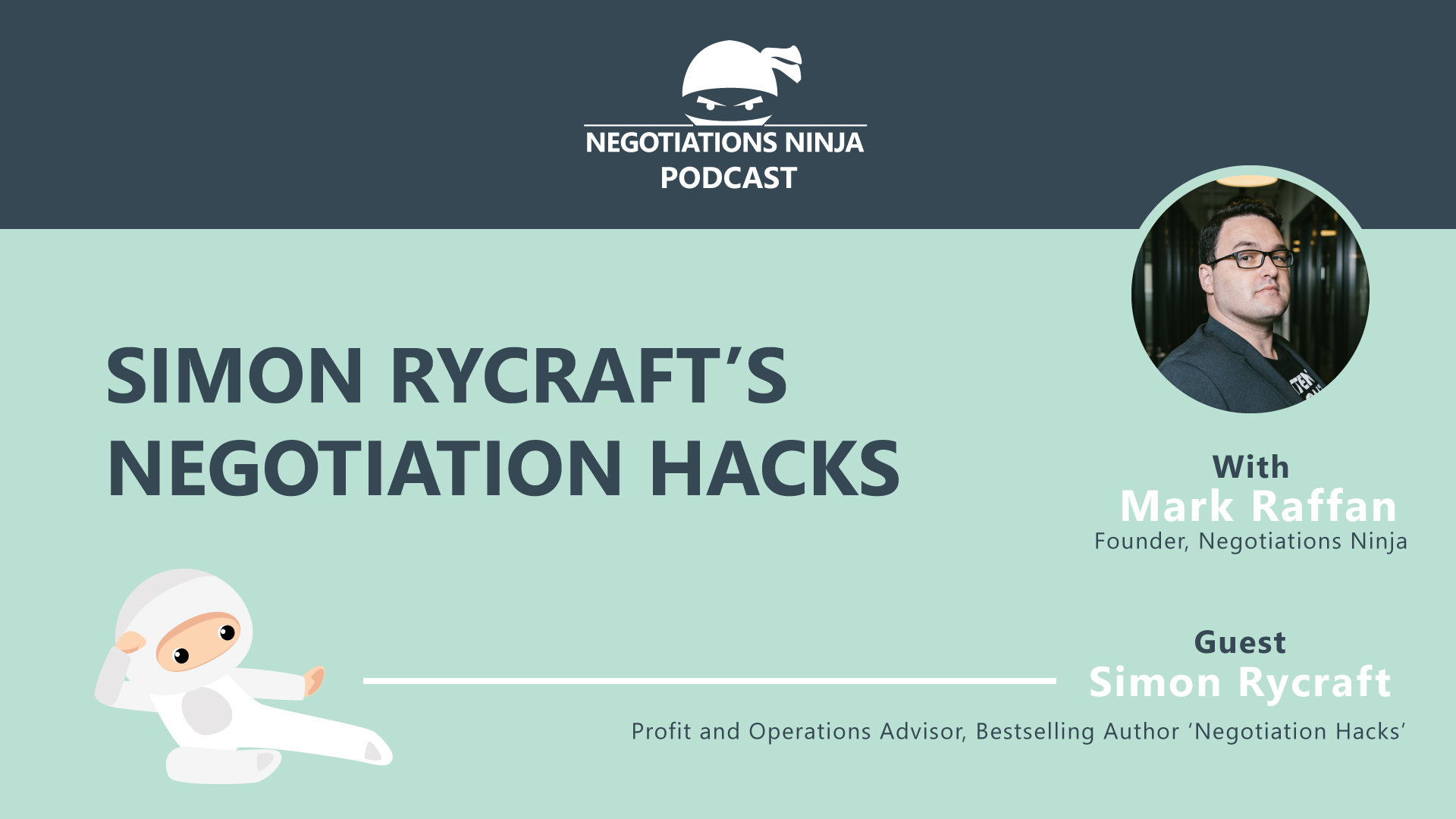In his book, “Negotiation Hacks: Expert Tactics To Get What You Want,” Simon Rycraft explains six proven hacks he’s used throughout his career that anyone can learn. In this episode of Negotiations Ninja, we talk about some of the hacks in his book, including what’s required to be persuasive, different negotiating styles, and even why “the power of attraction” can be important to the outcome of a negotiation. Don’t miss it!
Outline of This Episode
- [5:00] What’s required to be a persuasive person?
- [8:44] How to integrate emotion into the conversation
- [13:51] The leveraging of emotion in a negotiation
- [16:00] The different personality styles in negotiation
- [20:50] How Hippocrates’ personalities compare to DiSC
- [22:00] Hack #5: The law of attraction
- [26:39] How to connect with Simon Rycraft
What’s required to be a persuasive person?
Aristotle talked about three principles that are required to be persuasive when you’re negotiating with someone (which Simon reviews in his book). What are those three principles?
- Pathos: This is the emotion you apply. If someone is trying to persuade you, they need to be passionate about what they’re discussing.
- Ethos: This is the reputation side of who you’re talking to. If you’ve worked with someone before, they’ll trust you. People are naturally distrustful if they don’t know you.
- Logos: Logic is providing data points, statistics, etc. If you omit that information, you don’t come across as credible. It also makes you come across as more persuasive.
Simon uses these principles for writing emails, in discussions, and to structure messaging. Aristotle wrote this 2,300 years ago, and it’s still used by every salesperson and in every advertisement on TV.
Most procurement people are good with logic. They’re okay with ethos, where they have some social proof, the right qualifications, etc. But a lot of them fail with emotional conversations. They can’t bridge the gap between logos and pathos. They can’t tie someone’s emotions to the decisions that need to be made.
How can procurement work to bring emotion into the negotiation conversation? Listen to learn more!
The different personality styles in negotiation
All modern personality/communication styles seem to be based on the original work that Hippocrates did. What are the four styles?
- The choleric personality: They tend to be passionate, ambitious, and bold.
- The melancholic personality: They are more reserved, anxious, and unhappy.
- The sanguine personality: They are joyful, eager, and optimistic.
- The phlegmatic personality: They are calm, reliable, and thoughtful.
The real guiding principle is to understand what your dominating style is and ask for a consensus. Ask people you work with, friends, and family where they think you fall in the personality categories.
Simon does note that personality is complex and fluid and changes based on who you’re talking to. The dominant styles are driven by nature versus nurture. Some of it comes from genetics and some from your upbringing, family environment, where you went to school, and even the personality types you interacted with.
Your personality types can morph and change. You can change your communication style and personality to suit the conversation. All of the personalities can blend, shift, and change. So why is it important to understand? When you can understand personality traits in people, you can learn to communicate with them how they want to be communicated with. That can be powerful. It doesn’t have to be manipulative or coercive.
Empathy is a superpower, and this is one way to use it. If you apply the wrong style, you’ll find yourself in a difficult situation.
How Hippocrates’ personalities compare to DiSC
When you look at the choleric personality, it seems to align with the ”D” or dominant personality. The melancholic personality seems to line up with the “C,” or the “S.” The Sanguine is the “i” or influential personality. The phlegmatic personality is calm and reliable—just like the “C” or conscientious personality type. If you’ve researched any of this, let me know! I’d be interested in having a conversation.
How is the law of attraction important in negotiation? Listen to hear Simon’s thoughts!
Resources & People Mentioned
- Negotiation Hacks (Book): https://www.amazon.com/Negotiation-Hacks-Expert-Tactics-Capital/dp/B085DQBBPB
- The Power of Persuasion (Book): https://www.amazon.com/Power-Persuasion-Were-Bought-Sold/dp/0471763179
- Influence (Book): https://www.amazon.com/Influence-Psychology-Persuasion-Robert-Cialdini/dp/006124189X/
- DiSC Profile: https://www.discprofile.com/what-is-disc
Connect with Simon Rycraft
- Connect on LinkedIn
Connect With Mark
- Follow Negotiations Ninja on Twitter: @NegotiationPod
- Connect with Mark on LinkedIn
- Follow Negotiations Ninja on LinkedIn
- Connect on Instagram: @NegotiationPod




